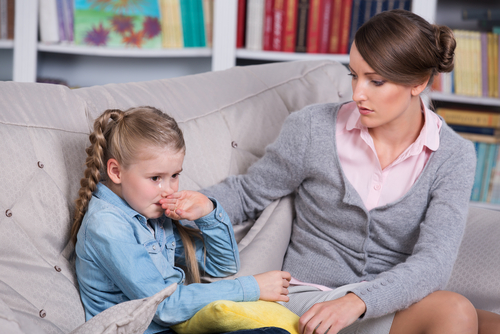
02 Nov Does My Child Need a Therapist?
Parents typically are much more worried about having to take their child to a professional than the kids are. Kids and teens usually  view their therapist (well, a good one) as an adult sounding board: someone besides their parents who can offer “what if” scenarios to help develop strategies and problem-solving skills in common situations.
view their therapist (well, a good one) as an adult sounding board: someone besides their parents who can offer “what if” scenarios to help develop strategies and problem-solving skills in common situations.
Kids come to therapy for a wide range of concerns, and the reasons that parents consider seeking help will vary greatly depending on the age and developmental stage of the child. In school-aged and pre-school children, there may be situations where skill-building in social, academic and emotional arenas appear to be falling behind that of their peers, or lacking in basic areas. A parent may notice these challenges, or may be informed of such concerns by a school social worker, teacher or a pediatrician who suggests further investigation into an issue which may be more emotional in nature than physical.
In teenagers, some of those skills may have been developed effectively early on, but there is a regression or retreat from previous areas of competence. Also, negative behaviors or attitudes that cause significant stress in family, friendship and school/work relationships will frequently motivate parents to seek outside help.
Common Range of Parent Concerns (depending on age of child)
• Excessive worries or fears
• Perfectionistic tendencies
• Irritability or over-reactivity
• Difficulty with transitions
• Difficulty socializing with same-aged peers
• Sleep issues
• School refusal or avoidance
• Decline in academic performance as an indicator of social/emotional struggles
• Inability to identify, express or cope with feelings
• Unresolved loss issues
• Frequent or heavy conflict with family/friends
• Poor eating habits (too much/too little)
• Lack of interest in formerly desired activities
• Lingering negative mood or attitude
• Aggressive or risky behaviors towards self or others
• Non-compliance with authority figures (e.g., teachers, parents)
Who should I call? A social worker? A counselor? A psychologist? A psychiatrist?
Licensed clinical social workers (LCSW) have a master’s degree in social work and at least 3000 clock hours of supervised training in a clinical setting before taking the licensing exam. They also receive supervision training and consultation during their clinical experience.
Licensed professional counselors have a master’s degree in clinical psychology, also with 3000 clock hours of supervised training in a clinical setting before taking the clinical licensing exam.
Licensed marital and family therapists also have a master’s degree in marriage and family therapy and are well-trained to work with children, teens, parents, couples, and families. MFTs have graduate training (a Master’s or Doctoral degree) in marriage and family therapy and at least two years of clinical experience. Like their counterparts, marriage and family therapists regularly practice short-term therapy and prefer to offer brief, solution-focused treatment that is specific, with therapeutic goals with the end of treatment in mind. About half of the treatment provided by marriage and family therapists is one-on-one with the other half divided between marital/couple and family therapy, or a combination of treatments.
These professionals do not need a doctorate degree to practice in their field, but can be in-network providers for health insurance, which helps families afford therapy services. Social workers and counselors often charge less per session for the work they do than their psychologist counterparts, who often also conduct psychological evaluations and testing and sometimes do therapy as well. Psychiatrists may offer therapy, but often are sought when medication is a consideration.
What to Expect In a Therapy Session
Before bringing a younger child in for therapy, a parent will typically meet for an initial session alone with the clinician to discuss concerns, review any previous treatment or diagnostic assessments, and answer any questions for the parent. In a first session with the child (which may or may not include the parent), the therapist assesses in a non-judgmental, supportive way specific information related to the child’s personality, style of relating, and areas of concern. This assessment forms the basis for creating a treatment plan, and identifying specific goals within that plan that are related to the development of the child’s self-directed problem-solving skills.
Parents of older teens often start the therapy process with a phone consultation with the therapist, bypassing the need for an in-person meeting, and the therapist meets with the teen individually from the beginning. In this case, parents are included in the process whenever necessary and useful.
Ongoing communication between parent and clinician is an important part of the therapy process as treatment goals are met or modified. One of the most important goals of therapy is to enable the child/teen (and family) to become skillful and confident in their problem-solving abilities, so that the therapist is no longer-needed. Follow-up or “booster” sessions are available after therapy ends, so that any new or unresolved concerns can be addressed if the need arises.

Dori has provided therapeutic services to children, adolescents, adults, and families since 1994 in several areas of social work including foster care, schools, hospitals, and private practice. She earned her Master of Social Work from The University of Illinois at Chicago’s Jane Addams College of Social Work in 1997 and her Bachelor of Science in psychology from the University of Illinois at Urbana-Champaign.
She is an Amazon best-selling author and a professional speaker who has been interviewed on ABC, NBC, various podcasts, and radio shows as an expert discussing therapeutic topics and her published works.
Dori offers speaking presentations on various therapy-related topics including, but not limited to anxiety, depression, ADHD, executive functioning, life transitions, effective communication, parenting strategies, work/life integration, and even staying sane while staying informed. She also speaks to businesses and business owners about the importance of hiring for company cultural fit, networking, leadership, and business growth. As a multi-location private therapy practice owner, she provides a culture of accountability, compassion, and creativity, emphasizing the importance of collaboration (with client consent) with parents, teachers, and other professionals to provide the most beneficial services to achieve maximum results for all clients to translate to every aspect of their lives.
As a mother of three, she knows the excitement and challenges of navigating parenting, behavioral and emotional distress, social pressures and rejection, academic successes and struggles, and identity formation. Dori is passionate about providing clients with the tools they need to navigate the challenges they face now to improve their quality of life long after therapy ends.



No Comments